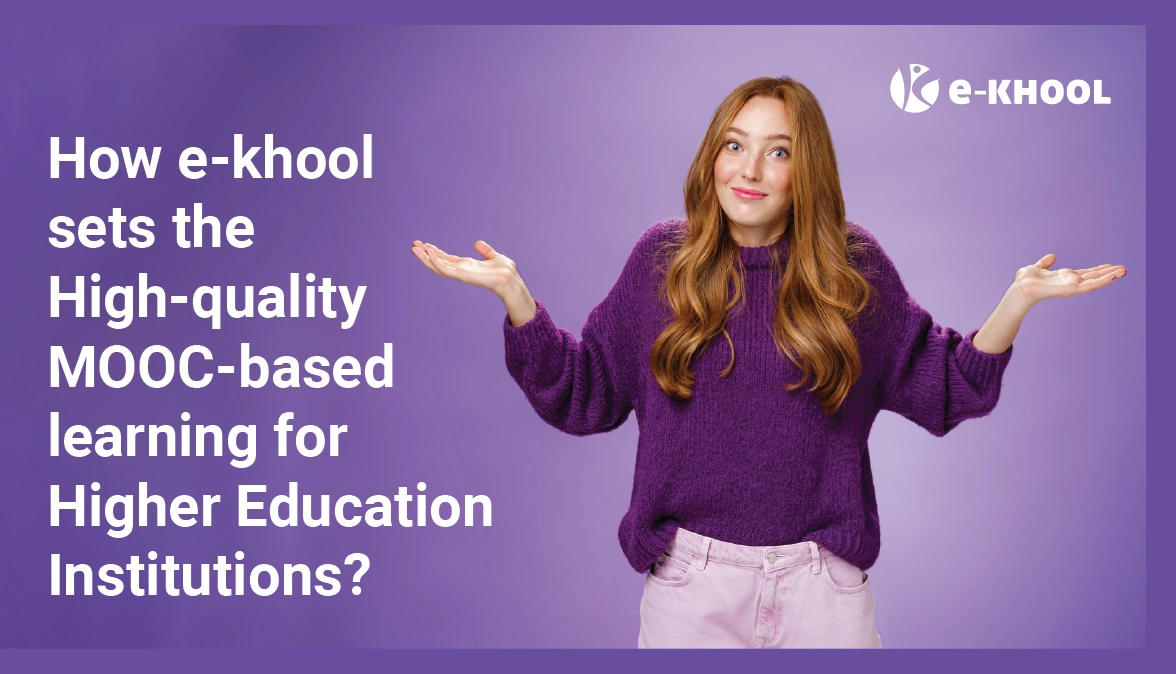Setting the Standard for MOOCs (Massive Open Online Courses) Learning
MOOCs (Massive Open Online Courses) have revolutionized higher education as universities and colleges worldwide are integrating it to enhance student learning. However, ensuring high-quality MOOC-based learning requires an advanced LMS (Learning Management System) with structured content delivery, interactive features, and a seamless learning experience.
This article explores MOOC-based learning, its importance for higher education, and why MOOCs recognition is essential. It covers key considerations before enrolling, highlights e-khool's advantages in delivering high-quality MOOCs, and explains the benefits of e-khool's MOOC approach, including AI-powered learning, flexibility, and cost-effectiveness.
What is MOOC-Based Learning?
MOOC-based learning refers to a digital learning platform where students can enroll in an online course simultaneously, allowing access to quality education regardless of location, financial status, or institutional affiliations. These courses are typically offered by universities, professional organizations, and e-learning platforms, making them a valuable resource for both academic and career growth.
Key Features of MOOC-Based Learning
-
Open Access & Global Reach
-
Scalability & Flexibility
-
Rich Course Content & Multimedia Integration
-
Collaborative Learning & Peer Interactions
-
Recognition & Certification
MOOCs are designed to remove geographical and financial barriers, enabling learners from anywhere in the world to access high-quality educational resources.
MOOCs can accommodate thousands of learners at a time without compromising the learning experience. Students can learn at their own pace or follow structured timelines with instructor-led courses.
Courses include video lectures, reading materials, quizzes, assignments, and case studies to provide an engaging and comprehensive learning experience.
Features like discussion forums, group activities, and peer evaluations enable learners to engage with instructors and fellow students.
Many MOOCs offer completion certificates, industry-recognized credentials, and academic credits, enhancing employability and professional growth.
Why Should MOOCs Recognition Be a Qualitative Mandatory for Higher Education Institutions?
Higher education institutions must recognize MOOCs to maintain academic credibility, provide cost-effective learning solutions, and align with global educational trends. As MOOCs gain necessity, universities must integrate them into their academic programs to stay relevant and competitive.
-
Expanding Learning Opportunities for Students
-
Enhancing Skill-Based Education
-
Cost-Effective Learning Model
-
Supporting Lifelong Learning & Professional Development
-
Accreditation & Credit Transfer Opportunities
Universities can extend their reach beyond traditional classrooms, making learning accessible to a diverse group of students, including working professionals and international learners.
MOOCs provide specialized courses in AI, cybersecurity, digital marketing, business analytics, and more, ensuring students develop industry-relevant skills alongside traditional degree programs.
By integrating MOOCs, universities can reduce costs associated with physical infrastructure, faculty resources, and printed materials, while maintaining high-quality education standards.
MOOCs offer continuous learning opportunities, allowing students and professionals to upgrade their skills and remain competitive in the job market.
Many universities now accept MOOCs as part of degree programs, allowing students to earn credits and recognized certifications for career or academic advancement.
LMS Australia - Best Learning Management System Providers in Australian Context
In Australia, Learning Management Systems (LMS) are playing a major role in transforming how education and training are delivered for education and corporate segment.
ekhool.com
Key Considerations Before Enrolling in a MOOC
Choosing the right MOOC is essential to ensure a valuable learning experience. Before enrolling in a course, learners and educational institutions should carefully evaluate the following factors.
Course Credibility & Reputation
Certification & Recognition
Course Structure & Learning Objectives
Data-Driven Insight
A well-structured MOOC should include engaging content such as quizzes, assignments, projects, case studies, and peer-reviewed activities to enhance understanding and retention. Features like discussion forums and live Q&A sessions should be available to enable learners to interact with instructors and fellow students for a collaborative learning experience.
Assessment & Progress Tracking
It is important to check whether the course is offered by a reputable university, organization, or instructor, as this ensures the quality and reliability of the content. Prospective learners should look at reviews and success stories from past students to understand the effectiveness of the course and its real-world applications.
Before enrolling, learners should confirm if the course provides an official certificate or academic credit that can be used for career advancement or further studies. It is also necessary to check if the certificate is recognized by employers, universities, or professional organizations to ensure its value in the job market.
Learners should review the syllabus to ensure that the course covers both theoretical concepts and practical applications relevant to their field of study or career. It is beneficial to verify if the course offers a balance between self-paced learning and instructor-led sessions, as this impacts engagement and learning outcomes.
Learners should check if the MOOC includes graded assignments, quizzes, and exams that help evaluate their understanding and provide constructive feedback. A good MOOC should allow learners to track their progress, achievements, and areas for improvement through an intuitive dashboard or analytics system.
Also Read: Instructor-led training (ILT) and How to Use it in e-learning Programs
Experience e-khool's Advantage in High-Quality MOOC-Based Learning Approach
e-khool LMS provides a powerful and flexible platform that enables universities and institutions to develop, manage, and deliver high-quality course delivery, thus adhering to MOOCs standard seamlessly.
AI-Powered Personalized Learning Paths
Interactive Learning Tools & Gamification
Seamless LMS Integration for Universities
Scalable & Secure Cloud Infrastructure
e-khool LMS is built on a robust cloud-based infrastructure, enabling it to support large-scale MOOC Model learning without any performance issues, even with thousands of concurrent learners. The platform ensures data security by adhering to global e-learning standards and compliance regulations, protecting sensitive learner information.
Mobile Learning & Offline Access
e-khool LMS leverages artificial intelligence to provide tailored course recommendations based on learners' progress, interests, and career goals, ensuring a more effective learning experience. The platform includes adaptive assessments that adjust the difficulty level based on student performance, allowing for personalized learning and targeted skill development.
e-khool enhances student engagement by incorporating interactive tools such as quizzes, leaderboards, discussion boards, and peer collaboration activities. The platform includes AI-powered chatbots that assist students with common queries, provide instant feedback, and help them navigate through the course material.
Universities can integrate e-khool LMS with their existing management systems, databases, and digital libraries, ensuring a smooth transition to MOOC-based flipped classroom model. The platform supports API-based integrations that allow institutions to connect third-party tools and external content providers for a more comprehensive learning experience.
With e-khool's mobile-friendly design, learners can access their courses from any device, allowing for flexible and convenient learning on the go. The LMS platform also supports offline learning, enabling students to download course materials and complete assignments even when they have limited or no internet access.
Benefits of MOOC-Based Learning& in e-khool's Perspective
e-khool LMS enhances the effectiveness of MOOC-based learning by providing a structured, engaging, and technology-driven experience. Here's how e-khool ensures the best learning outcomes:
Cost-Effective Learning for Institutions and Learners
Scalable and Flexible Learning Model
AI-Driven Personalization for a Better Learning Experience
e-khool LMS integrates AI-driven recommendations, providing learners with customized course suggestions based on their skills, interests, and career goals. The adaptive learning system dynamically adjusts course content and difficulty levels based on learners' performance, ensuring a personalized and effective learning journey.
High-Engagement Learning with Interactive Features
Enhanced Assessment and Certification Capabilities
Seamless Integration with University Systems
Mobile and Offline Learning Capabilities
Compliance with International Learning Standards
e-khool LMS allows higher education institutions to provide affordable education to a large number of students without the need for physical classrooms, reducing operational costs. Learners benefit from reduced expenses related to commuting, textbooks, and accommodation, making high-quality education accessible from anywhere.
e-khool supports thousands of concurrent learners, making it ideal for institutions looking to expand their reach globally without limitations. The self-paced nature of MOOCs on e-khool LMS allows students to learn at their own speed, accommodating different learning styles and schedules.
e-khool's MOOC-based model includes gamification elements such as badges, leaderboards, and certificates to keep students motivated throughout their courses. Discussion forums, peer assessments, and live Q&A sessions encourage collaboration and knowledge-sharing, making learning more engaging and interactive.
e-khool LMS supports AI-proctored exams, quizzes, and graded assignments, ensuring academic integrity and reliable assessment of student performance. Institutions can issue verifiable digital certificates that learners can share on LinkedIn or with potential employers, increasing the value of their learning achievements.
Universities can integrate e-khool LMS with their student management systems, ensuring a unified learning experience without the need for multiple platforms. API-based connectivity allows institutions to integrate additional tools, such as third-party content libraries, career guidance modules, and external assessment tools.
e-khool ensures that students can access their courses from any device, whether a laptop, tablet, or smartphone, promoting flexible learning. The platform also supports offline learning, allowing learners to download course materials and complete assignments without an internet connection.
e-khool LMS adheres to SCORM, xAPI, and other global e-learning standards, ensuring content compatibility and seamless course migration for institutions. The platform is built with data privacy and security measures to protect student and institutional data, aligning with compliance requirements.
By offering a scalable, flexible, and engaging MOOC-Based experience for learners, e-khool LMS enables higher education institutions to deliver world-class education efficiently.
Frequently Asked Questions
Final Thoughts
MOOC-based learning is reshaping the future of higher education, offering flexible, scalable, and cost-effective solutions. Universities must leverage advanced LMS platforms like e-khool to ensure high-quality course delivery, learner engagement, and academic recognition.
e-khool LMS provides cutting-edge AI-driven solutions, seamless integrations, and an engaging user experience, making it the perfect choice for institutions aiming to implement MOOCs effectively.
Personalized Learning Paths for Every Team Member
Contact Support

